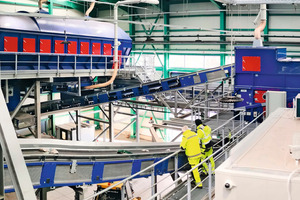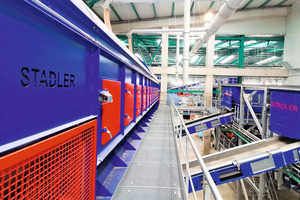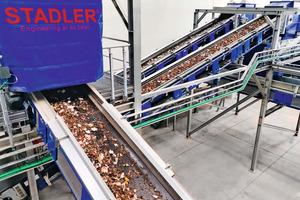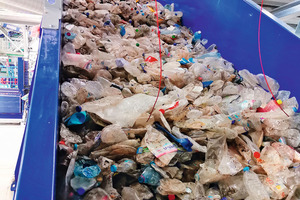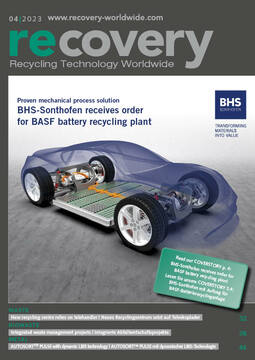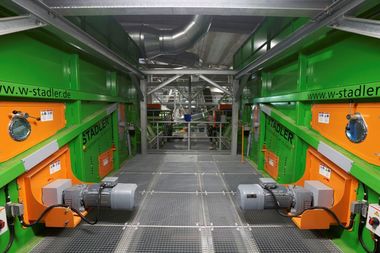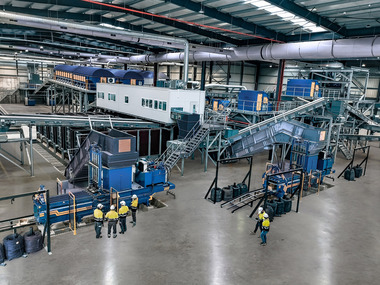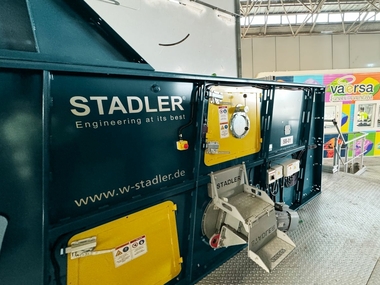MRF and Compost Refinement plants for TERNA ENERGY in Tripoli/Greece
Greek renewable energy company TERNA Energy, a subsidiary of GEK TERNA Group, is one of the leading players in clean energy production and storage, and the largest investor in Renewable Energy Sources in Greece. It further consolidates its role in sustainable development and circular economy through its integrated waste management projects. For this area of its activity, the company has chosen STADLER, the globally active German company specialized in the planning, production and assembly of turnkey recycling and sorting plants, as strategic partner in Public Private projects for the design and installation of Materials Recovery Facilities (MRF) in the Epirus region and now also in the Peloponnese.
STADLER has now completed the commissioning and start-up of the latest facility, an MRF and Compost Refinement Plant in Tripoli, the capital city of the Peloponnese region, and two further projects in Sparta and Kalamata are in progress. The new facility stands out for its high degree of automation and efficiency, and for its capacity to adapt to changing material composition. It produces consistently high-quality output, achieving outstanding recovery rates – above 90 % for the organic fraction, plastic containers, bottles and paper, and 80 % for biofilms and PE film. It is also designed to facilitate maintenance, with easy access to all components and motors for service.
High efficiency and adaptability for
consistently high-quality output
The sorting plant receives mixed Municipal Solid Waste (MSW) with an input capacity of 30 to 40 t/h in a single line. It is processed to produce a high-quality output of recyclates and organic material. The former – PET, HDPE, PP/PS, Foils, Paper, Cardboards, Ferrous and non-Ferrous cans and containers – are sorted into automatic bunkers and then baled. The latter, in two fractions – one passing from Anaerobic Digestion and the other from vessel composting – are further processed in the compost refinement plant with a capacity of 10 t/h, producing two fractions of clean compost with different specifications and material size.
STADLER’s design team developed a plant that delivers the high-quality output required by Terna Energy, effectively addressing the challenge presented by the peculiarities of the waste stream in the region: “The Peloponnese is a very touristic region, and this has an effect on the composition of the waste, with high variations in seasonal consumption and diversity of packaging,” explains Dimitris Blanas, Head of Sales Greece & Middle East at STADLER.
The process begins with two trommel screens and then a STADLER STT5000 Ballistic Separator that separates the rolling, flat and screened fractions. At this stage of the process, Pellenc ST COMPACT optical sorters, seamlessly integrated with STADLER’s high-speed conveyors, come into play to sort waste by material and color on the two main lines: 2D for flat objects such as mixed paper, cardboard and film, and 3D for hollow objects such as bottles, containers and trays. These sorters, which feature Pellenc ST’s latest advanced technology, are perfect for the task with their compact size, low energy consumption and high level of performance, as well as their capability to manage the volumes and variations in the feed: “The high capacity of this equipment will be able to absorb the increase of waste volumes, says Steve Halpin-Gosset, Regional Sales Director, South Europe at Pellenc ST. “Thanks to their high scalability, sorting settings can also be adapted according to input stream composition changes.”
Effective collaborative approach ensures timely delivery
“We had a very short time for completing the assembly and the plant was required to run at full capacity on the first day of hot commissioning, because of the high volumes of municipal waste arriving and the restrictions for storage facilities,” explains Dimitris Blanas. Close collaboration with the teams from TERNA Energy, technological partner Pellenc ST and suppliers was key to delivering on time. “We focused on effective coordination of all the teams, as well as careful timing of deliveries ahead of assembly to avoid wasting any time. Also, detailed checks and meticulous preparation throughout the assembly and cold commissioning phases were critical.”
The entire project unfolded to the satisfaction of TERNA Energy, as expressed by Diomidis Kamoutsis, Project Manager, who appreciated “STADLER’s solid design and quality equipment, together with the effective management of the project in all its phases – from designing to delivery, construction and commissioning. Their team was always available, fast in responding whenever an issue arose, coordinating and supporting the construction team, effectively collaborating with the other providers and suppliers on site. The fast delivery and installation were impressive.”
As part of its partnership with TERNA Energy, STADLER has designed two further MRF and Compost Refinement plants with similar characteristics and capacity in the area of Lakonia and Messenia, also in the Peloponnese region. STADLER will support the three plants with a local service team and a dedicated maintenance storage center. These three plants, together with the facility designed and built by STADLER in Epirus, will be the most advanced MRF sorting plants in operation in the country.

